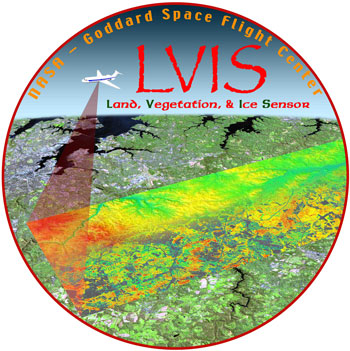Note we are working to stage all LVIS data sets at NSIDC.
For datasets available at the NSIDC:
Data collected since ~2009 are available to download from the NSIDC,
along with an associated DOI. The DOI is found on the relevant
Data Download page and should be used in the References section of
your publication. More info on how to use the DOI can be found at NSIDC.
For datasets not yet available at the NSIDC and downloaded from the LVIS website:
Product Name:
- Nominal 20m-spaced LVIS Ground Elevation (LGE) Data and Canopy
Structure Data
- Nominal 20m-spaced LVIS Canopy Top Elevation (LCE) Data.
- Nominal-20m spaced LVIS Geolocated Waveform (LGW) Data.
Authors:
J. Bryan Blair, NASA Goddard Space Flight Center
Michelle Hofton, University of Maryland College Park
David Lloyd Rabine, NASA Goddard Space Flight Center.
Date: 2018
Version: 1.2
Publisher: Code 61A NASA Goddard Space Flight Center.
Instrument Citation:
J. B. Blair, D. L. Rabine, and M. A. Hofton,
The Laser Vegetation Imaging Sensor (LVIS): A medium-altitude, digitization-only,
airborne laser altimeter for mapping vegetation and topography, ISPRS Journal of
Photogrammetry and Remote Sensing, 54, 115-122, 1999.
Data Set Citation:
Processing of NASA LVIS elevation and canopy (LGE, LCE and LGW) data products,
J. B. Blair, M. A. Hofton, and D. L. Rabine.
http://lvis.gsfc.nasa.gov, 2018.
Data set acknowledgement:
Data sets were provided by the Land, Vegetation and Ice Sensor
(LVIS) team in Code 61A at
NASA Goddard Space Flight Center
with support from the
University of Maryland, College Park.
Please choose the appropriate acknowledgement from the following:
- Funding for the collection and processing of the 2003 Northeastern USA data was
provided by NASA's Terrestrial Ecology Program (NASA Grant number NAG512112).
- Funding for the collection and processing of the 2003 Maryland and Virginia data was
provided by the VAccess-MAGIC consortium and NASA's Stennis Space Center, and
data collection was performed in collaboration with the Mid-Atlantic Regional Earth Science
Applications Center (RESAC) at the University of Maryland.
- Funding for the collection and processing of the 1998 Costa Rica data were provided by the
Vegetation Canopy Lidar (VCL) Science team (NASA grant number NAS597160) and
NASA's Interdisciplinary Science Program (IDS) (NASA grant number NNG04GO05G).
- Funding for the collection and processing of the 1999 US data were provided by the
Vegetation Canopy Lidar (VCL) Science team (NASA grant number NAS597160) and
NASA's Interdisciplinary Science Program (IDS) (NASA grant number NNG04GO05G).
Reference for 1998 Costa Rica Data Set:
Hofton, M.A., Rocchio, L.E., Blair, J.B., and Dubayah, R., Validation of Vegetation
Canopy Lidar sub-canopy topography measurements for a dense tropical forest,
Journal of Geodynamics, 34, 491-502, 2002.
Reference for 2007 Greenland Data Set:
M. A. Hofton, J. B. Blair, S. B. Luthcke, and D. L. Rabine (2008),
Assessing the performance of 20 - 25 m footprint waveform lidar data collected
in ICESat data corridors in Greenland, Geophysical Research Letters, 35, L24501,
doi:10.1029/2008GL035774.



